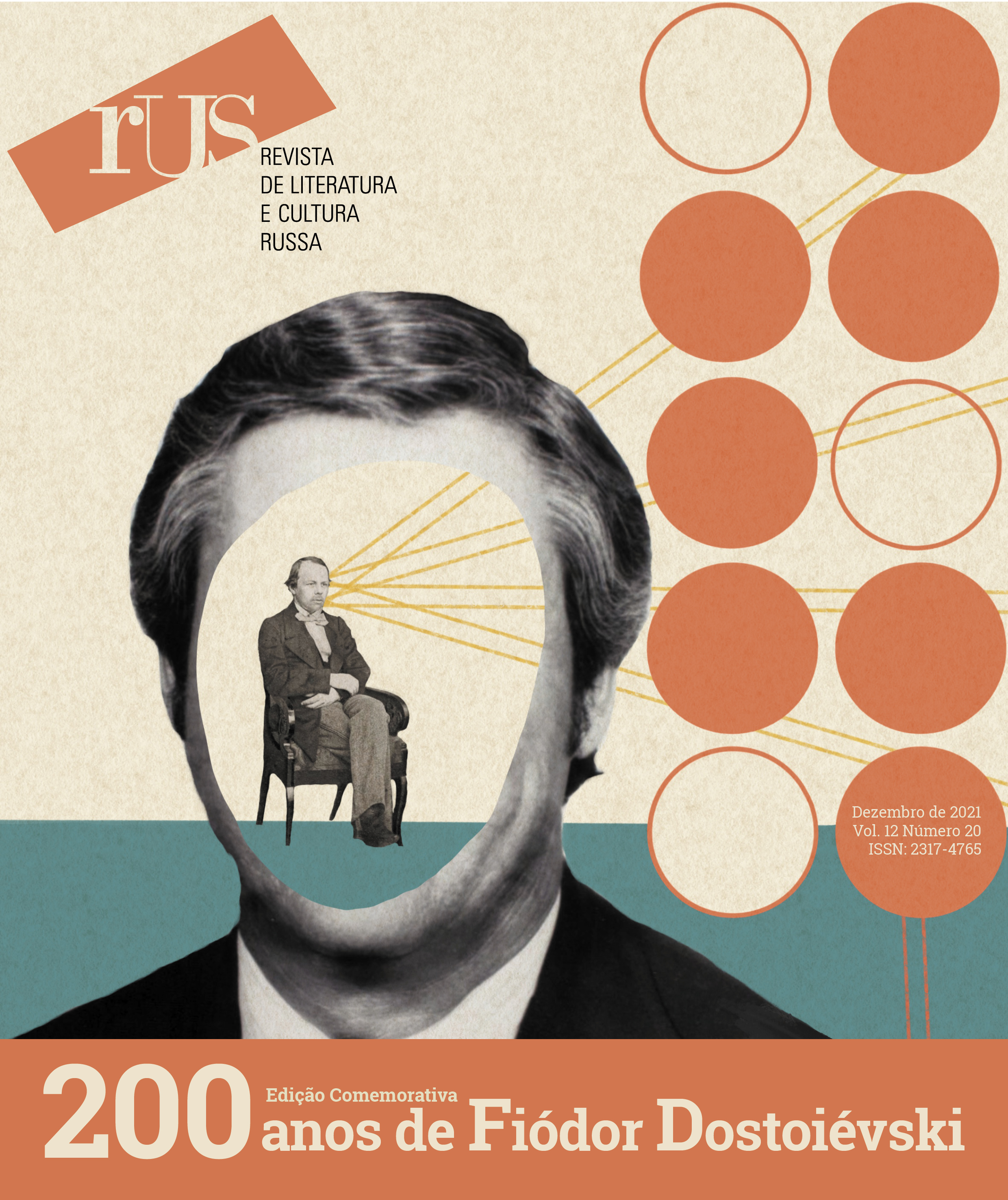Ser (e deixar de ser) o homem doente, o homem mau e o homem desagradável: notas sobre Memórias do subsolo
DOI :
https://doi.org/10.11606/issn.2317-4765.rus.2021.191500Mots-clés :
Memórias do subsolo, Devir literário, Sintomatologia, DeleuzeRésumé
O presente artigo comenta e analisa as estratégias e o percurso narrativo do protagonista anônimo das Memórias do subsolo (1864), de Fiódor Dostoiévski, com o intuito de destacar a pertinência de uma leitura critico-clínica acerca da novela, tendo em vista o estudo das sintomatologias e o diálogo com o pensamento de Gilles Deleuze que diz respeito à literatura como devir, à função do escritor como médico da civilização e ao sujeito larvar das micropolíticas que atua nos efeitos do real e na potência do impossível. O texto tem também como objetivo levantar a hipótese ensaística de que o homem do subsolo experencia transcendentalmente um efetivo movimento entre a enfermidade e a saúde do mundo, entre o bem e o mal e, por fim, entre a crítica negativa e a afirmação do desejo na vida, sempre sob vias de transbordar esses limites todos. Para tal aproveitamento, discute-se igualmente algumas observações centrais a propósito da obra e/ou da filosofia do tempo de Dostoiévski realizadas por René Girard, Bakhtin, Nietzsche, Sergio Givone, dentre outros. De uma leitura diferencial da novela à leitura da teoria literária contemporânea, o artigo se utiliza das Memórias como um local intensivo de disputas pelo sentido da escrita, da mimese como técnica poética primordial e do gênero textual das confissões, ou melhor, dos castigos correcionais que conjuram por aporias.
Palavras-chave: Memórias do subsolo; devir literário; sintomatologia; Deleuze.
##plugins.themes.default.displayStats.downloads##
Références
BAKHTIN, Mikhail. Problemas da poética de Dostoiévski. Tradução de Paulo Bezerra. Rio de Janeiro: Forense Universitária, 1997.
DELEUZE, Gilles. Imanência: uma Vida... Tradução de Sandro Kobol Fornazari. São Paulo: Limiar - vol. 2, nº 4 - 2º semestre de 2016.
DELEUZE, Gilles. Nietzsche et la philosophie. Paris: PUF, 2018.
DELEUZE, Gilles. “A literatura e a vida”. In: Crítica e clínica. Tradução de Peter Pál Pelbart. São Paulo: Editora 34, 2011.
DELEUZE, Gilles. “Sobre a filosofia”. In: Conversações. Tradução de Peter Pál Pelbart. São Paulo: Editora 34, 2010.
DELEUZE, Gilles; GUATTARI, Félix. “1730 – Devir-intenso, devir-animal, devir-imperceptível...” In: Mil platôs, v.4. Tradução de Suely Rolnik. São Paulo: Editora 34, 2012.
DOSTOIÉVSKI, Fiódor. Memórias do subsolo. Tradução de Boris Schnaiderman. São Paulo: Editora 34, 2009.
FARINA, Diego Lock. A teoria crítico-clínica e a política da literatura fora da representação: acontecimento e devir e diferença... Porto Alegre: LUME-UFRGS, 2021. Disponível em: http://hdl.handle.net/10183/223930. Acesso em: 14 out. 2021.
GIRARD, René. Dostoiévski: do duplo à unidade. Tradução de Roberto Mallet. São Paulo: Realizações Editora, 2011.
GIVONE, Sergio. “Dizer as emoções. A construção da interioridade no romance moderno”. In: A cultura do romance. Org: Franco Moretti. Tradução de Denise Bottmann. São Paulo: Cosacnaify, 2009.
GROSSMAN, Évelyne. “Le corps-xylophène d’Antonin Artaud (Préface)”. In: Pour en finir avec le jugement de dieu. Paris: Éditions Gallimard, 2003.
LUKÁCS, Georges. Significado presente do realismo crítico. Tradução de Carlos Saboga. Lisboa: Cadernos de hoje, n°5, 1964.
NIETZSCHE, Friedrich. Além do bem e do mal. Tradução de Renato Zwick. Porto Alegre: L&PM, 2010.
RANK, Otto. Don Juan. Une étude sur le double. Paris: Denoël et Steele, 1932.
Téléchargements
Publiée
Numéro
Rubrique
Licence
(c) Copyright Diego Lock Farina 2021

Ce travail est disponible sous licence Creative Commons Attribution - Pas d’Utilisation Commerciale - Partage dans les Mêmes Conditions 4.0 International.
Os autores que publicam na RUS concordam com os seguintes termos:
a. Os autores mantém os direitos autorais e concedem à revista o direito de primeira publicação, com o trabalho simultaneamente licenciado sob a Licença Creative Commons Atribuição 4.0 Internacional (CC BY-NC-SA) que permite o compartilhamento do trabalho com reconhecimento da autoria e publicação inicial nesta revista.
b. Os autores têm autorização para assumir contratos adicionais separadamente, para distribuição não-exclusiva da versão do trabalho publicada nesta revista (ex.: publicar em repositório institucional ou como capítulo de livro), com reconhecimento de autoria e publicação inicial nesta revista.
c. Os autores têm permissão e são estimulados a publicar e distribuir seu trabalho online (ex.: em repositórios institucionais ou na sua página pessoal) a qualquer ponto antes ou durante o processo editorial, já que isso pode gerar alterações produtivas, bem como aumentar o impacto e a citação do trabalho publicado (Veja O Efeito do Acesso Livre).





